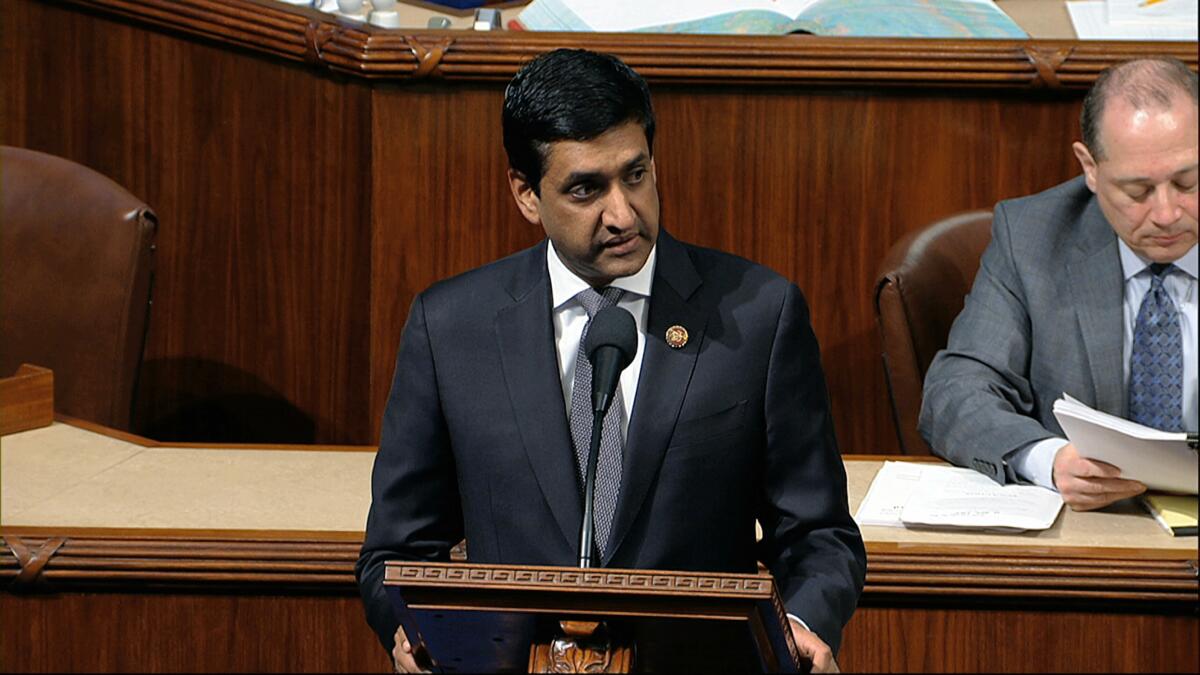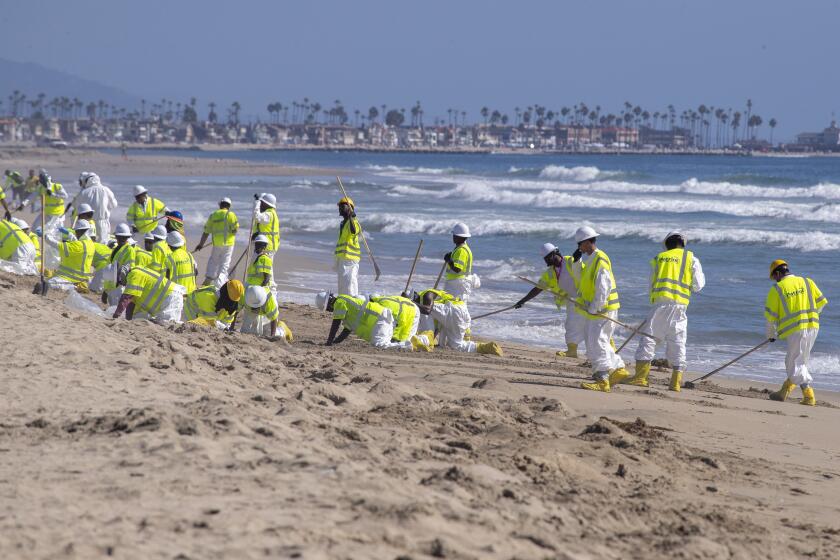California lawmakers demand more info from two federal agencies on massive oil spill

- Share via
WASHINGTON — Federal lawmakers are demanding more information on the massive oil spill off the coast of Orange County as a legislative battle looms over whether to include a ban on future offshore drilling in a scaled-down $3.5-trillion bill.
The House Oversight and Reform Committee on Wednesday requested records from federal agencies to figure out whether regulatory failings contributed to a pipeline spilling an estimated 144,000 gallons of crude oil into the Pacific Ocean.
In a letter to the federal regulators, Rep. Carolyn B. Maloney (D-N.Y.), chairwoman of the oversight committee, and five Democratic members of the California delegation documented what they described as troubling compliance issues with Amplify Energy’s San Pedro Bay Pipeline, which is operated by Beta Operating Co., the source of last week’s leak.
A massive oil spill off the Orange County coast has fouled beaches and killed birds and marine life
The lawmakers are seeking briefings and documents related to federal inspections of the San Pedro Bay Pipeline, as well as documents detailing enforcement actions for noncompliance by Amplify and Beta since Jan. 1, 2011.
The lawmakers wrote that the Interior Department’s Bureau of Safety and Environmental Enforcement has documented about 125 noncompliance incidents by Beta since 2011, which led to at least 53 warnings, 71 “component shut-in violations” and a “facility shut-off” violation. The Transportation Departments Pipeline and Hazardous Materials Safety Administration, the lawmakers added, has issued multiple warnings to Beta since 2008, including a corrective action order Tuesday.
“This is particularly concerning because the pipeline reportedly should have been monitored by an automated leak detection system,” they wrote in the letter, which was obtained by The Times. “The damage from the spill is widespread, and local officials fear that some of it will be irreversible. Despite efforts to contain the damage, dead birds and oil-covered fish have been washing up along the ocean’s shores. The extent of the ecological damage has yet to be determined.”
In a statement, Maloney called the images coming from the waters off the Orange County coast “devastating.”
“This oil spill has wreaked havoc on the California coastline and its wildlife, while putting the health of nearby communities at risk,” Maloney said. “The consequences of these types of oil spills are often long-lasting, and I am committed to seeking accountability for those responsible and reforms to prevent similar tragedies in the future.”
In an interview, Rep. Ro Khanna (D-Fremont), who chairs the oversight panel’s environment subcommittee and signed the letter, said lawmakers want to understand what led to the oil spill and why Amplify failed to report the oil spill to the National Response Center until at least 10 hours after federal and California authorities learned of the incident. The company also did not warn local officials and the public about the spill until hours after it told the response center, Khanna and the other lawmakers wrote.
“What do we need to do to prevent these kinds of violations from happening again in California, and why is it that people didn’t know about the leak until it was too late and it was hours after the leak?” he asked. “Why is that the case? What went wrong?”
Khanna said he expects regulatory agencies to cooperate with members of Congress and stressed that “we have to understand the past violations of the pipeline safety regulations and why those violations continue.”
The letter was addressed to the acting directors of the Bureau of Safety and Environmental Enforcement and the Pipeline and Hazardous Materials Safety Administration, and it was signed by Maloney, Khanna and Reps. Alan Lowenthal, Katie Porter, Mike Levin and Nanette Diaz Barragán.
Federal lawmakers are also seeking to take legislative action. Sens. Alex Padilla and Dianne Feinstein of California joined a trio of other West Coast Democrats in urging their chamber’s leaders to include a prohibition on new oil and gas drilling off the coasts of California, Oregon and Washington in the multitrillion-dollar reconciliation bill that’s being negotiated on Capitol Hill.
“Budget reconciliation provides us with an opportunity to construct the energy policy of the future and avoid the worst impacts of climate change,” the senators wrote in the letter to Senate Majority Leader Charles E. Schumer (D-N.Y.) and Sen. Joe Manchin III (D-W.Va.), chairman of the Energy and Natural Resources Committee. “In taking advantage of this opportunity, we must reflect the will of our constituents and permanently ban new offshore oil and gas drilling along the West Coast. Doing so would help build a cleaner, more sustainable energy future.”
Padilla told MSNBC on Wednesday that the spill is “the most recent reminder to why we need to end offshore oil drilling, both because of the ecological disasters and economic impacts that disasters like this have.”
The proposed ban on future offshore drilling will need the support of every single Democrat in the Senate and most in the House in order to pass. Levin (D-San Juan Capistrano), who has been in his district since the weekend and toured the spill Monday by boat and helicopter, said he could see the oil stretching toward Dana Point and is working to make sure a ban on future drilling remains in the House’s reconciliation bill.
“It’s in the bill now — Page 984,” he said. “I haven’t received any indications that it will be removed. I’m optimistic that it will stay.”
Rep. Jared Huffman (D-San Rafael), who sponsored the House version of the bill that California’s senators are also supporting, sounded confident that drilling prohibitions would not suffer from the same party divisions that have bogged down Democrats’ domestic policy package.
“I’m not going to say it’s a lock. But I’m encouraged,” he told The Times. “Among the Democrats needed to get to 50 in the Senate, there are no champions of offshore drilling.”
Some environmental advocates said they are disappointed the proposals don’t go further to phase out drilling that’s currently taking place or to require that old offshore oil platforms be decommissioned. Even if it becomes law, oil and gas companies that hold existing leases would still be able to apply to the federal government for permits to drill new wells.
“We need to see a phaseout of existing drilling,” said Miyoko Sakashita, oceans program director for the Center for Biological Diversity. “All of these offshore platforms are just waiting to be the next oil spill.”
At the state level, multiple elected officials are also calling for oversight hearings. State and local leaders representing the areas hit by the spill have raised questions about the Coast Guard’s initial response, following a report in The Times that state and federal authorities were alerted to a spill as early as Friday night.
The Coast Guard did not survey the area until the following morning, citing inconclusive information and the difficulty of surveying the area in the dark — despite a second report from the National Oceanic and Atmospheric Administration that one of its satellites had detected a sheen in the water that it identified with “high confidence” as oil.
State legislators have also raised questions about the operator of the pipeline and the condition of its equipment. Some legislators are calling for increasing bans on drilling in state waters.
Assemblywoman Janet Nguyen (R-Huntington Beach), whose district has beaches that were hit with oil, said that she and other legislators “want a full investigation. And I want to hold people accountable for this incident.”
Times staff writers Anita Chabria, Chris Megerian and Anna Phillips contributed to this report.
More to Read
Get the L.A. Times Politics newsletter
Deeply reported insights into legislation, politics and policy from Sacramento, Washington and beyond. In your inbox three times per week.
You may occasionally receive promotional content from the Los Angeles Times.













